高三英语 情态动词表推测复习课件 (共17张)
文档属性
| 名称 | 高三英语 情态动词表推测复习课件 (共17张) | 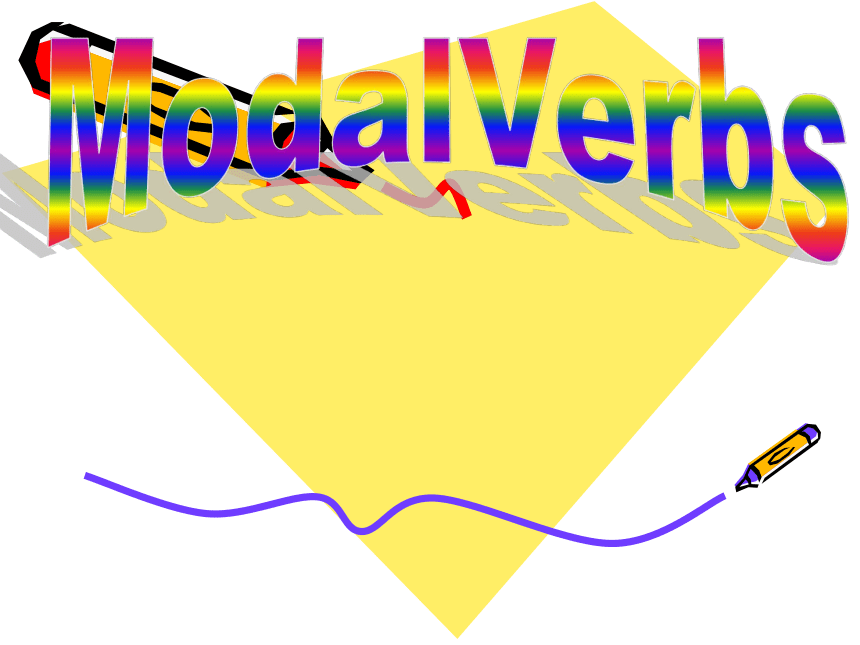 | |
| 格式 | zip | ||
| 文件大小 | 239.1KB | ||
| 资源类型 | 教案 | ||
| 版本资源 | 通用版 | ||
| 科目 | 英语 | ||
| 更新时间 | 2019-06-04 22:13:50 | ||
图片预览

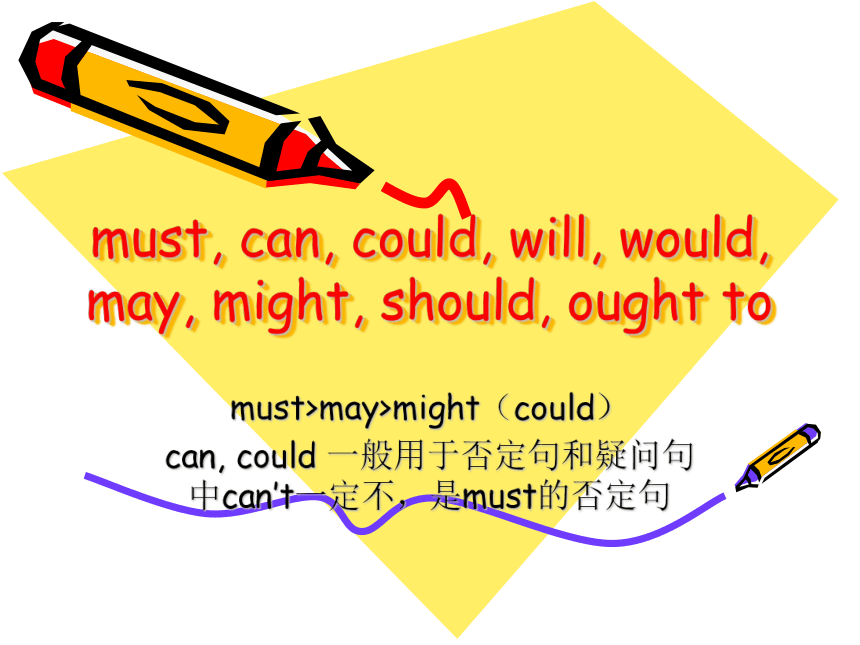
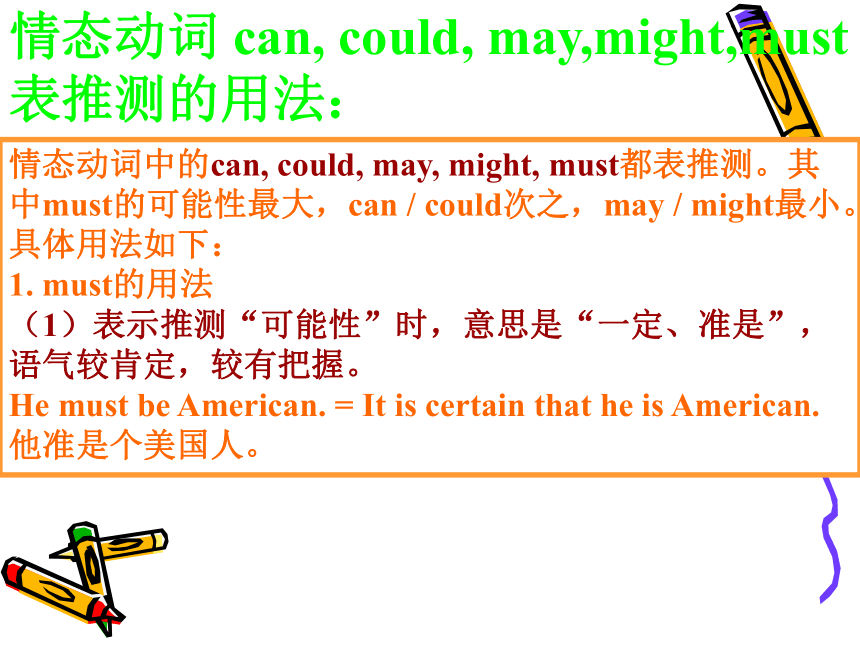
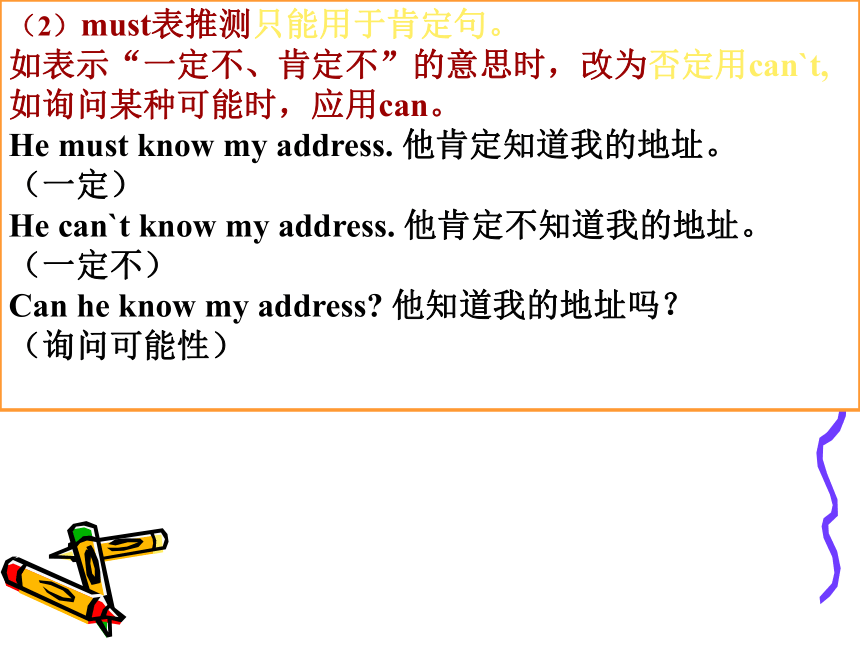
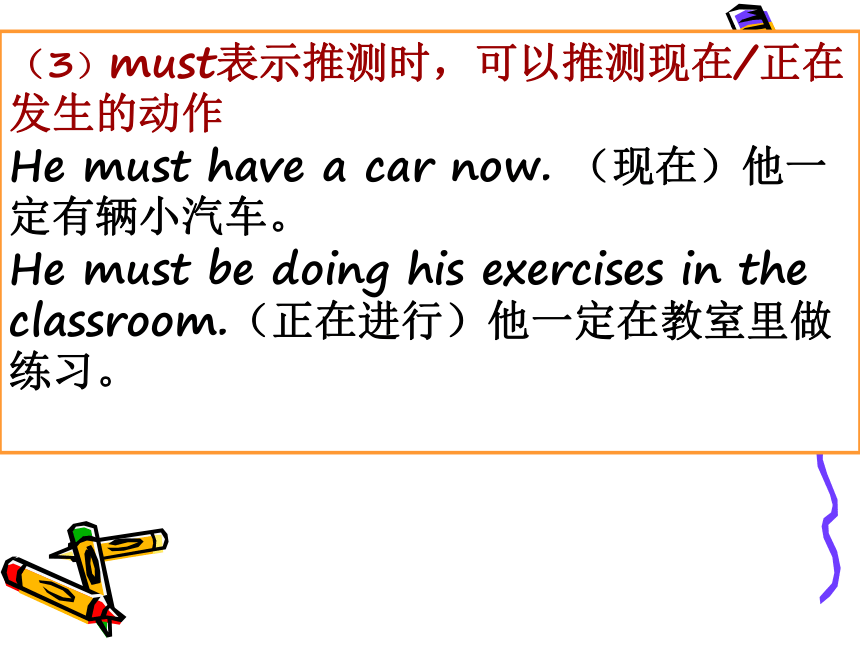
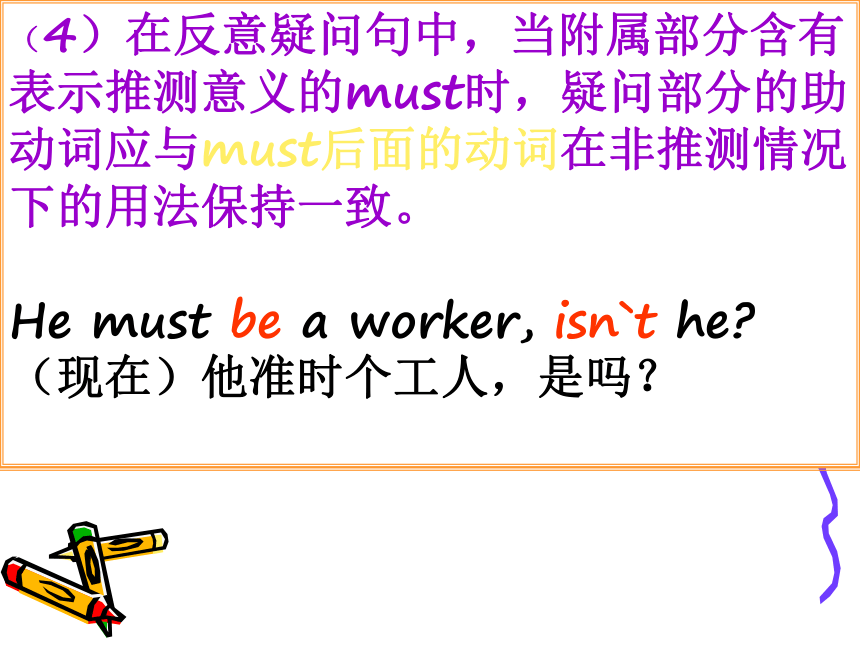
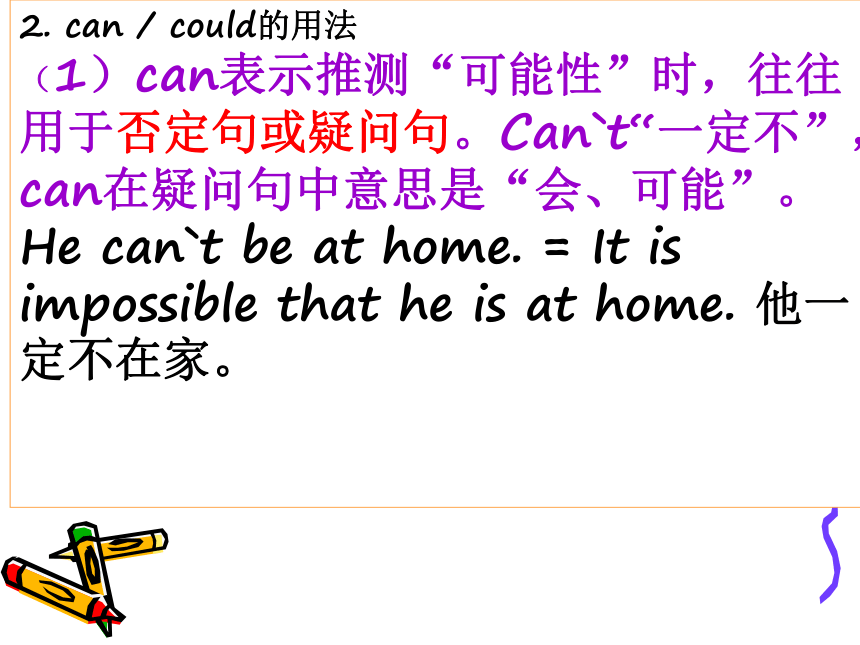
文档简介
课件17张PPT。 ModalVerbsmust, can, could, will, would, may, might, should, ought tomust>may>might(could)
can, could 一般用于否定句和疑问句中can’t一定不,是must的否定句情态动词 can, could, may,might,must表推测的用法: 情态动词中的can, could, may, might, must都表推测。其中must的可能性最大,can / could次之,may / might最小。具体用法如下: 1. must的用法 (1)表示推测“可能性”时,意思是“一定、准是”,语气较肯定,较有把握。 He must be American. = It is certain that he is American. 他准是个美国人。(2)must表推测只能用于肯定句。
如表示“一定不、肯定不”的意思时,改为否定用can`t,
如询问某种可能时,应用can。 He must know my address. 他肯定知道我的地址。
(一定) He can`t know my address. 他肯定不知道我的地址。
(一定不) Can he know my address? 他知道我的地址吗?
(询问可能性) (3)must表示推测时,可以推测现在/正在发生的动作
He must have a car now. (现在)他一定有辆小汽车。 He must be doing his exercises in the classroom.(正在进行)他一定在教室里做练习。 (4)在反意疑问句中,当附属部分含有表示推测意义的must时,疑问部分的助动词应与must后面的动词在非推测情况下的用法保持一致。
He must be a worker, isn`t he? (现在)他准时个工人,是吗?
2. can / could的用法 (1)can表示推测“可能性”时,往往用于否定句或疑问句。Can`t“一定不”,can在疑问句中意思是“会、可能”。 He can`t be at home. = It is impossible that he is at home. 他一定不在家。 (3)could 还可以用于表示客气、委婉、礼貌的请求语气。
Excuse me, could you tell me the way to the bus station? Could you help me?
3. may和might的用法 (1) may, might表示推测“可能性”时,意思是“可能”、“也许” He may / might be American. = It is possible that he is American. 他可能是个美国人。 注:might不表示过去时态,只是语气上比may更委婉,表示的可能性更小。 (2)may, might表推测时,可以用于否定句,意思是“可能不、也许不”,但不用于疑问句。 He may / might not be at home. 他也许不在家。 情态动词表推测的三种句式 1.在肯定句中一般用must (一定),may(可能),might / could(也许,或许)。
It ——— be Ning’s. It has her name on it 。
T he guitar ———— belong to Alice. She plays the guitar.
2.否定句中用can’t / couldn’t(不可能), may not/might not(可能不)。
(1)It ______ be the headmaster. He has gone to America
(2)He ————know the scientist. 他也许不认识那位科学家。 3.疑问句中用can/could (能……?)。 (1)—————— he finish the task? 他可能把任务完成吗? (2)———— he be at home now? 他现在能在家吗? Choose the best answers : 1. I thought you______ like something to read. So I have brought you some books. A. ought B. might
C. would D. must2. –That man must be Sarah’s husband. --No, he_____ be her husband. She is still single. A. can’t B. mustn’t
C. may not D. ought to
3. Peter _____come with us tonight, but he isn’t very sure. A. must B. may C. can D. will 4. –What____ it be? --It______ be a mail box, for it is moving.
It______ be a car. A. can; can’t; must B. can; can; must C. can; mustn’t; must D. must; mustn’t; can
5. –Look, someone is coming. Guess__________ . --Jack. He’s always on time. A. who can it be B. who he may C. who he can be D. who it can be6. David, you _____play with the valuable bottle, you_______ break it. A. won’t; can’t B. mustn’t; may C. shouldn’t; must D. can’t; shouldn’t 7. Sue________ come together with us tonight, but she isn`t very sure yet. A. must B. may
C. need D. will
can, could 一般用于否定句和疑问句中can’t一定不,是must的否定句情态动词 can, could, may,might,must表推测的用法: 情态动词中的can, could, may, might, must都表推测。其中must的可能性最大,can / could次之,may / might最小。具体用法如下: 1. must的用法 (1)表示推测“可能性”时,意思是“一定、准是”,语气较肯定,较有把握。 He must be American. = It is certain that he is American. 他准是个美国人。(2)must表推测只能用于肯定句。
如表示“一定不、肯定不”的意思时,改为否定用can`t,
如询问某种可能时,应用can。 He must know my address. 他肯定知道我的地址。
(一定) He can`t know my address. 他肯定不知道我的地址。
(一定不) Can he know my address? 他知道我的地址吗?
(询问可能性) (3)must表示推测时,可以推测现在/正在发生的动作
He must have a car now. (现在)他一定有辆小汽车。 He must be doing his exercises in the classroom.(正在进行)他一定在教室里做练习。 (4)在反意疑问句中,当附属部分含有表示推测意义的must时,疑问部分的助动词应与must后面的动词在非推测情况下的用法保持一致。
He must be a worker, isn`t he? (现在)他准时个工人,是吗?
2. can / could的用法 (1)can表示推测“可能性”时,往往用于否定句或疑问句。Can`t“一定不”,can在疑问句中意思是“会、可能”。 He can`t be at home. = It is impossible that he is at home. 他一定不在家。 (3)could 还可以用于表示客气、委婉、礼貌的请求语气。
Excuse me, could you tell me the way to the bus station? Could you help me?
3. may和might的用法 (1) may, might表示推测“可能性”时,意思是“可能”、“也许” He may / might be American. = It is possible that he is American. 他可能是个美国人。 注:might不表示过去时态,只是语气上比may更委婉,表示的可能性更小。 (2)may, might表推测时,可以用于否定句,意思是“可能不、也许不”,但不用于疑问句。 He may / might not be at home. 他也许不在家。 情态动词表推测的三种句式 1.在肯定句中一般用must (一定),may(可能),might / could(也许,或许)。
It ——— be Ning’s. It has her name on it 。
T he guitar ———— belong to Alice. She plays the guitar.
2.否定句中用can’t / couldn’t(不可能), may not/might not(可能不)。
(1)It ______ be the headmaster. He has gone to America
(2)He ————know the scientist. 他也许不认识那位科学家。 3.疑问句中用can/could (能……?)。 (1)—————— he finish the task? 他可能把任务完成吗? (2)———— he be at home now? 他现在能在家吗? Choose the best answers : 1. I thought you______ like something to read. So I have brought you some books. A. ought B. might
C. would D. must2. –That man must be Sarah’s husband. --No, he_____ be her husband. She is still single. A. can’t B. mustn’t
C. may not D. ought to
3. Peter _____come with us tonight, but he isn’t very sure. A. must B. may C. can D. will 4. –What____ it be? --It______ be a mail box, for it is moving.
It______ be a car. A. can; can’t; must B. can; can; must C. can; mustn’t; must D. must; mustn’t; can
5. –Look, someone is coming. Guess__________ . --Jack. He’s always on time. A. who can it be B. who he may C. who he can be D. who it can be6. David, you _____play with the valuable bottle, you_______ break it. A. won’t; can’t B. mustn’t; may C. shouldn’t; must D. can’t; shouldn’t 7. Sue________ come together with us tonight, but she isn`t very sure yet. A. must B. may
C. need D. will
